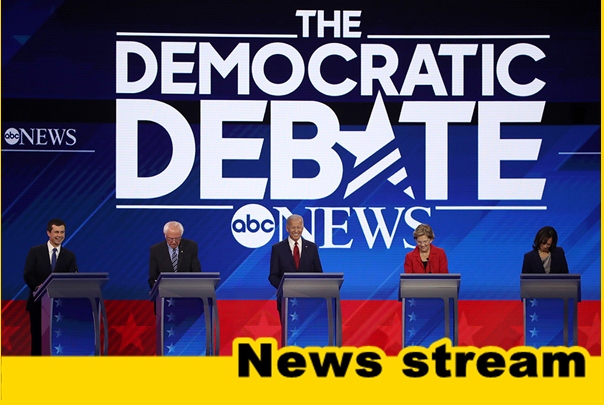
Ten Democratic candidates were again packed on the debate stage, yet this time they had more room to breathe.
ABC’s ground rules and moderators’ style Thursday night in Houston cut down on the feeding frenzy nature of past televised debates. The network offered the candidates 15 more seconds for answers and rebuttals than were allotted on NBC and CNN and the moderators tended to avoid cutting off the candidates in mid-sentence, which was the case during the 2nd debate in July.
The result was a contest heavier on policy differences and lighter on the kinds of finger-pointing and quips that marked the two previous rounds of Democratic debates.
In the midst of it all, longtime Hillary Clinton aide Philippe Reines praised ABC for having “learned from the best & worst of the previous two.”
Some of this was due to the gravitas of George Stephanopoulos and David Muir, the ABC stalwarts whose deft handling of the exchanges between candidates gave the debate a smoothness lacking in earlier rounds. The two veterans were joined by ABC correspondent Linsey Davis and Univision anchor Jorge Ramos, whose pointed questions drew more attention.
At one point, the audience at Texas Southern University cheered when Davis grilled Sen. Kamala Harris on her shifting positions on criminal justice issues and asked, “When you had the power, why didn’t you try to affect change then?”
Davis, who is black, began a segment focused on racism by acknowledging the debate was being held at a historically black college and that young black voters were especially concerned with the issue. Ramos, an anchor at Spanish-language Univision, which partnered with ABC on the debate, kicked off questions on immigration by grilling former Vice President Joe Biden the three million deportations during the Obama years.
“Are you prepared to say tonight that you and President Obama made a mistake about deportations?” Ramos asked. “Why should Latinos trust you?”
Ramos isn’t a neutral voice on the issue of deportations, having sparred with former President Barack Obama on the topic in 2014. And his aggressive follow-ups to Biden on the deportation issue – “You didn’t answer the question,” he said at one point – are likely to revive complaints that he sometimes veers into advocacy.
Nonetheless, Democratic Rep. Alexandria Ocasio-Cortez suggested journalists take notes from his line of inquiry.
“He is asking tough, but fair questions — not to stir drama or seek a gotcha moment — but to hold people accountable to their records and have them answer for it,” Ocasio-Cortez wrote of Ramos on Twitter.
At times, all four anchors could be accused of focusing disproportionately on the leading candidates – in this case, Biden, Massachusetts Sen. Elizabeth Warren and Vermont Sen. Bernie Sanders, who were appearing together for the first time.
Stephanopoulos kicked off the debate by grilling the three of them on health care, which tops many polls of leading issues among Democratic primary voters. The ensuing conversation, in which Biden attacked his two rivals for abandoning Obamacare in favor of Medicare for All, provided some early fireworks but also complaints that other candidates were being ignored.
“Just an FYI for those watching at home, there are more than just 3 candidates on the stage,” noted Booker national press secretary Sabrina Singh. “Would be great if the candidates of color got some questions their way.”
Booker eventually got into the mix, and spoke for more minutes on stage than all but Biden and Warren. The moderators brought in all the candidates and asked a wide range of questions on domestic and foreign policy.
However, it took nearly two hours to get to a question on the climate crisis, another top concern among Democratic primary voters and one in which activists have urged the party to make the focus of an entire debate.
Dan Pfeiffer, a former Obama adviser and co-host of “Pod Save America,” suggested that “every one of these debates makes a better case for a climate debate moderated by experts.”
Candidates, at times, offered their own critiques of the proceedings.
Sanders took a jab at the network sponsor, telling Stephanopoulos during the health care discussion that it is an “absurd” system in which ABC runs advertising from the industry “telling you how bad Medicare for All is, because they want to protect their profits.” (Sanders offered a similar critique of CNN during the second Democratic debate.)
And South Bend Mayor Pete Buttigieg took a swipe at the TV debate spectacle, which can devolve into on-stage scrums over differences big and small.
“This is why presidential debates are becoming unwatchable,” Buttigieg said.
Former HUD Secretary Julian Castro, however, appeared unbothered by the sparring, responding, “That’s called a Democratic primary debate.”
Source: politico.com
See more here: news365.stream






